by Frank Casper
It is important before reading this piece that the reader know that it is largely about theology, and specifically about theology at the UUA as presented at this year’s General Assembly. I am writing it because it is something I have always been interested in and believe to be important. I believe this because of the one essential lesson that I learned from my graduate education at BU School of Theology. Whatever else theology may be about, it is first and foremost always about power, who has it, the terms in which it is exercised, and why. To put it another way, every theology has a politics.
But before I get into the message of GA, I want first to praise the technical team. This was the first all virtual GA in the history of the event, and from a technological perspective, it was first rate. What with thousands in attendance with differing credentials attending multiple simultaneous sessions, all recorded, and apart from the occasional glitch, to be expected with any task as complex as this clearly was, the technical team did a magnificent job. This will no doubt now be a crucial tool for the future of such gatherings. Hat’s off to those responsible.
Consistent General Assembly Message
I will also say that the theme of the entire program and most of the workshops were consistent throughout. The GA management team could hardly have done a better job of coordinating the message with the programs they chose. Having said that, it is the message with which I have concerns.
Despite a valiant effort to convey the laudable message that UUism will strive to lift up minority and historically marginalized voices, I could not help but be somewhat taken aback by the strident sense of grievance and retribution in this year’s GA. The opening speech delivered by Roxanne Dunbar-Ortiz on the first full day combined with the many programs following that concerned themselves with the history of oppression, and the overwhelmingly negative Action of Immediate Witness (AIW), particularly the AIW-A (attached), “Addressing 400 Years of White Supremacist Colonialism,” painted a picture of the United States, and its political, religious, and economic institutions as an agenda of avaricious and murderous white people protecting and advancing the interests of white supremacy. While our national history is definitely scarred, especially with the twin sins of slavery and racism, this overwhelmingly negative viewpoint fails to provide a foundation upon which we can unite and move forward to address these important issues. Which brings me to the single most important business event of this GA.
This condemnatory and unforgiving view of our country was highlighted in the centerpiece of the whole program, the report from the Commission on Institutional Change. The report was presented by its author, Dr. Elias Ortega, president of Meadville Lombard, and the other commission members. It is a document that every UU should read and understand, because it is the first and official effort of the UUA to create a sweeping redefinition of the core values of Unitarian Universalism. It is nothing less than the outlines of a new theology, which is distinct but related to another effort that can be found in books like “The Turning Point,” edited by Rev. Frederic Muir, and in essays like “Congregational Polity and the Myth of Congregational Autonomy” by Sue Phillips.
Committee on Institutional Change Report
The COIC report is grounded in Critical Race Theory (1) that spawned the distinct but related ideas of intersectionality and white supremacy culture. Indeed, soon after the presentation of the report, Dr. Ortega issued a 5-page essay (attached) preemptively defending CRT from its critics, particularly from those he identifies as liberals. The report, and its litany of recommendations, is guided by a simple principle, that the more one’s voice has been marginalized, the more one’s voice will be “centered” or amplified. But that principle can also legitimately be read in the obverse, that is, in terms of the theme of the GA described in the above paragraph, that white cisgendered people are a perennial problem and stubborn obstacles to progress toward social justice. In other words, if one is white and cisgendered, we will only be heard in so far as we are willing to admit our role in the perpetuation of white supremacy, to be followed by committing ourselves to a program of perennial therapy, ever struggling against our nature in the constant search for unconscious bias. This, I think, is the new meaning of the 4rth principle for the white and cisgendered. As one UU FB post said,
“I am a white ally. I have done decades of conscious work to undo my societally engrained racism. I still have racist thoughts or reactions. You have to understand we’ve had these ideas taught to us our entire lives. But that is not an excuse. I treat it similar to overcoming addiction and breaking the cycle of unhealthy thinking. It’s not easy. It requires consistent vigilance. And I still make mistakes. I’m lucky to have a wonderful community that will lovingly point out my mistakes. Sometimes they’re egregious errors and it hurts my ego deeply. It’s uncomfortable. But change is rarely comfortable.”
The related and parallel effort from Frederic Muir and others, and echoed in a recent article by UUA President Susan Frederick-Gray, concerns itself with what is called the three sins of Unitarian Universalism, excessive individualism, exceptionalism, and what is termed “a certain allergy to authority.” We suffer, in other words, from too much intellectual freedom. We think we can believe whatever we want and are free from any requirement of responsibility toward our faith community for the views we form. And we take pride in this, too much pride, in fact. We think too much of ourselves for our intellectual freedoms. And that lends itself to what they call that “allergy to authority.” We tend toward rebellion on grounds of conscience. “These three corrupting narratives”, writes Rev. Muir, “have shaped our story.” They form what he calls the iChurch, and they are a barrier to the Beloved Community. Muir and others believe that in order save UUism, we need to abandon our tradition of individually governed congregations and subject ourselves to a centralized religious authority.
It is reasonable to suspect that the meaning of the Beloved Community is outlined in the COIC report. This can be seen in the report itself in the change being made to the meaning of the 4rth principle. I quote:
“Freedom of belief promotes diversity of thought in our communities and fuels the responsible search for truth and meaning that leads toward beloved community. This freedom encourages exploration and experimentation, lending creativity and innovation to our communities. Yet over the decades since the consolidation of Unitarians and Universalists, an overemphasis on individual exploration and experience as the primary, if not sole center of religious experience developed. This centering of the individual decenters the communal as a locus of theological exploration. One of the unintended consequences has been the atomized individualism of the search for truth and meaning without accountability to its impact in the communities….”
Limits on Intellectual Freedom
In other words, there will be, or at least, the leadership of the UUA wants there to be, some kind of authority imposing limits on intellectual freedom. I think it reasonable to surmise that this may be the motive behind the push for the 8th principle, and its requirement of “accountability” for our actions. None of our other principles includes such a requirement – they are goals, not commandments. There is little if any effort so far that I’m aware of to define what “accountability” will mean, but I think there are clues in my remarks here.
In this context I want to draw attention to one particular workshop I attended, “Building Communities to Counter White Nationalism/White Power”, presented by Rev. Chris Rothbauer and Dr. Sharon Welsh. The title alone was intriguing as I had myself done a good deal of research into the nature and intent of this movement. And while Dr. Welsh presented a decent description of this movement, Rev. Rothbauer went on to turn the presentation into something I hadn’t expected. It turns out that the way to counter what we all now tend to subsume under the word alt-right is to put limits on free speech. Indeed, according to Rev, Rothbauer, and a book he tells us he’s deeply indebted to for the development of his views, “The Case Against Free Speech”, by P.E. Moskowitz, the problem with free speech is that it protects hate speech. It is imperative that hate speech be shut down, and in order to do that, we have to put limits somehow on free speech. In one of his later slides, Rev. Rothbauer writes:
“If we must give a platform and listen to every idea, there are no limits to the ideologies we must tolerate in the name of free speech.”
The remainder of his presentation attempts to present an alternative to tolerating noxious ideas and hate speech. He turns to what he calls “relational ethics”, and his presentation of what that means tracks well with the meaning of Beloved Community that Rev. Muir finds the three sins of UUism to be an obstacle to. The first bullet item of the Relational Ethics slide reads:
“We have the right to say things, but we are responsible to the people we are in relationship with.”
He says in the next bullet that this is the meaning of our fifth principle. His last bullet states:
“We don’t just tolerate hate speech because we think we have to but we seek to prevent hate speech from harming our loved ones, refuse to provide it platform, and seek to reconcile members of white nationalists groups to the larger community as well as prevent others from being recruited.”
One wonders what kind of policy this would be in practice within our faith community until one remembers that we have a superlative example in the case of Rev. Dr. Todd Eklof. It was, in fact, hate speech that he was accused of and eventually, because he would not capitulate to that interpretation of his book and apologize for his alleged sins, he was publicly censured and then unfellowshipped. And if you are wondering how Dr. Eklof’s book, firmly grounded as it is in religious humanism and the 7 principles that emerged from it, could be regarded as the kind of hate speech we see coming from white nationalists, then read one of the resources Rev. Rothbauer refers to in the supporting materials for his presentation, Andrew J. Mackay, “A Unitarian Universalist Pipeline to the Right?”, (2019) It is a short essay which tells the reader to be very wary of UU’s who talk about “postmodernism”, “political correctness”, “identity politics”, or “Critical Race Theory” in a negative way, for they may be sliding toward an embrace of the alt-right. Dr. Eklof criticizes all of these ideas, ergo, he must have gone over to the dark side. He must be an alt-right minister. The UUA must be protected from such criticism. Dr. Eklof had to go.
New UUism
This is not the Unitarian Universalism I’ve known and loved for nearly 4 decades. To me it seems clear that the trend is to be far less hospitable to legitimate differences of viewpoint, particularly around matters pertaining to race and racism. This is a new UUism. I don’t know what it’s becoming, but UU now suggests to me “Used to be Unitarian.”
Join the Conversation
Join the Fifth Principle Project. It is free. The Fifth Principle Project is an organic grassroots initiative to gather into community Unitarian Universalists who want to reinvigorate the right of conscience and renew the democratic process in the governing of our denomination.
Subscribe to Comments
Subscribe to comments below to follow the discussion.

Notes:
(1) Encyclopedia Britannica
Critical race theory (CRT), the view that the law and legal institutions are inherently racist and that race itself, instead of being biologically grounded and natural, is a socially constructed concept that is used by white people to further their economic and political interests at the expense of people of colour. According to critical race theory (CRT), racial inequality emerges from the social, economic, and legal differences that white people create between “races” to maintain elite white interests in labour markets and politics, giving rise to poverty and criminality in many minority communities. The CRT movement officially organized itself in 1989, at the first annual Workshop on Critical Race Theory, though its intellectual origins go back much further, to the 1960s and ’70s.
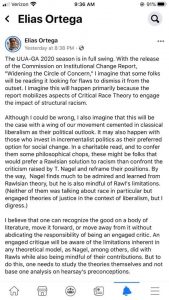
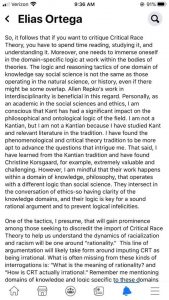
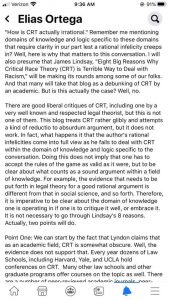
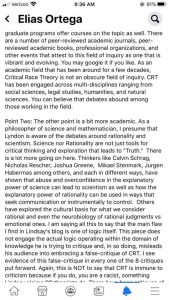
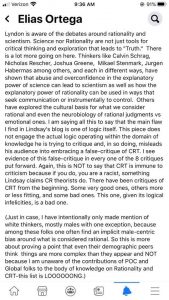

I am put in mind of the former Communist Block countries which while authoritarian structures held seemed to be communities of racial and ethnic harmony, but once those structures of authority fell, collapsed into intolerant beds of ethnic hatred and evil. Think of the former Yugoslavia that fractured into ethnic hatred. Watch the antigay movements in Russia, watch as China puts its minorities in “reeducation camps” and tries to supplant Tibetan culture and religion, watch has Poland and Hungary embrace anti-immigrant rightwing leaders. Enforce equality does not work in the long run. I thank you for this report. It is… Read more »
Well put, that is one of the best analysis of the former Soviet style nations which had a large degree of ethnic peoples, and how forced tolerance does not bring about an enlightened view of others. Its like a kid raised by strict religious parents, or a preacher’s kids, once out from under the heavy handed authority, they go hog wild!
Thanks for this alarming report from GA. I wish it could be distributed to all UU congregations so they can begin to understand that power is being stripped away from the laity in our congregations. That is what is happening. The laity (I am clergy) are our greatest source of strength and inspiration in our movement and this authoritarian trend you note is a betrayal of our core identity as a free faith movement – one that trusts in the wisdom and goodness of people. Thanks again for such a good report and for caring for the integrity of our… Read more »
Terrific analysis. I think I hear you say that the uu theology — as represented in GA — has one and only one core principle (not 7 just one) and that is to lift up the voices of marginalized people. I fear you are right. Lifting up the voices of marginalized people is a worthy goal …. is it necessary to then abandon other principles such as freedom of conscience. And long held principles of democracy and jystice? I sincerely hope not. Thx.
Thank you for your thoughtful analysis. I feel my time identifying as a UU is drawing to a close.
This is why I am trying to share our Unitarian legacy, to get back to our roots, its a good place to start some real progress in liberal religion and thought. In the past Unitarians were thought leaders and set the course in the United States, but as we degenerated in our principles, that went out the door until today we are pretty irrelevant, just tagging along with history. Here is a good place to share the words of our last, great Unitarian thought leaders, “A church that does not concern itself with the struggle in history for human decency… Read more »
There was a lot of vague talk about “accountability” at GA sessions, also from the Commission on Institutional Change. “Accountable to Whom?” was never answered explicitly, but some of us have figured it out. It means “Accountable” to a small number of acolytes of Critical Race Theory (CRT), especially African American “People of Color” (POC) but also their ideological “white allies”. And, yes, CRT does have a pseudo-religious flavor (surprisingly anti-UU in taste), even labeled as “cult-like” by one wag. When I questioned a young minister about the top-down imposition by the UUA of certain ideologies of race, this is what… Read more »
Re your claim “But unlike the UUA Board, Eklof’s congregation was more supportive. Just this week it voted out the anti-Eklof faction on their board, a faction which had been actively supported by the UUA hierarchy.” More accurately, the majority of the congregation voted for a new Board. A substantial portion of the congregation left to form a new church.
What was the fraction that split, and were they demographically distinct, I wonder…
I don’t know.
The schism is beginning, a decision of the UUA hierarchy, without congregational input. I wonder how far they will push it, especially given current financial shortfalls?
I believe your characterization is factually mistaken. “The congregation” did not all support Todd Eklof and did not “vote out a faction of the Board.” There was an annual meeting with a contested election and a majority voted for Board and Nominating Committee slates supporting Todd Eklof. A sizable group who then left UUCS is forming a new congregation in keeping with their own values. The characterization of this as a UUA-driven schism “without congregational input” is very strange and gives the impression you consider these people dupes and puppets of the UUA.
As someone who has held a socialist, anti-imperialist perspective highly critical of the US for almost 40 years, I am certainly not a liberal. Indeed, the worst insult I grew up with was to call someone a “white liberal.” However, as a new minister, I’m very concerned about the punitive, authoritarian aspect of this new UU theology, which demands declarations of guilt and repentance from all who don’t meet their definition of marginalized, and requires them to follow the lead of anyone who does, no matter what they are demanding. This new theology is not radically egalitarian. It is grounded… Read more »
Has anyone investigated what happened to the 3 tracks of ministry back in 2001, specifically the fate of Community Ministry? There are distinct, political parallels between what has been going on in the UUA and MFC back then and now. The year 2001 is when I became a “UU” in the sense of “Used to be a Unitarian”. I was a Community Ministry track student at Meadville Lombard back then and I was preparing to follow my calling to provide a ministry of presence for persons experiencing homelessness. The people in the pews– most congregations– had no knowledge and hence… Read more »
The current ministers of the UU Society for Community Ministries will be very surprised to hear that, despite their gains over the years, community ministry was actually eliminated nearly twenty years ago. Thanks for letting us in on these surprising developments!
Dick found this great video https://newdiscourses.com/2020/06/radical-lefts-resemblance-dogmatism/. The use of Maoist methods is particularly telling. Does the UUA already have its own Red Guard?
Great job! Thanks for starting this.
Absolutely disgusting. Ideas we like do not need legal protection. He isn’t just arguing on limits on free speech, he’s arguing for the elimination of free speech. I’m reminded of the old joke. A US soldier and a Soviet soldier are talking about their respective countries. The US soldier goes: “My country is the best because I can go right up to the White House, and shout that the President of the United States sucks and no one will stop me!” and the Soviet soldier goes, “Comrade, we have that right as well. I can also walk up to the… Read more »
That joke is a hoot, Jason. And, you may be right about what they’re arguing for. Thanks for your input.
An exceedingly relevant article, lengthy but really good.
https://kenanmalik.com/2015/08/13/free-speech-in-an-age-of-identity-politics/?fbclid=IwAR0RVOymPHvU8GPILA3llhHo3LAsqkbxUox88ta2T2_6JwYpUUHgaEMA_aI
Here is an exceedingly relevant piece written 13 years ago pertaining to developments at Meadville Lombard by Scott McIsacc. Ignore that you don’t get the references of who exactly he’s referring to. That’s not important.
https://socinian.blogspot.com/2007/05/toward-theology-of-anti-oppression-or.html?fbclid=IwAR2TpTUn78pQMgBSTN-JlK8UH5x68oB-c9RGzdQD0Q-VJWsmRpJpYu-2a7Q
This seems an approprate companion piece. The resignation letter of a long time UU.
https://www.dropbox.com/s/nzu9te8jjwo5faf/FCU%20Resignation.pdf?dl=0&fbclid=IwAR2Dn7lpRwC2kO6pydBALSozAZyDtZ1fqweTcMHOSWK5W82NplXC9mVjgSo
I urge you all to watch this video. It places into a much broader context what I heard at this years GA and why I wrote this piece The New Theology.
https://www.youtube.com/watch?v=wJwCGBhwYBo&feature=share&fbclid=IwAR0XB8Gepvpd2RqNJ4CvCOQad1-WF6hGgAOl599zPJqZcJavLWyKX_pnzx0
Thank you Frank! The information in the video was quite enlightening as were the topics/information covered by other videos on the website.
As a newcomer to this conversation, I’m finding it hard to catch up. Please, please, when citing external documents like Dr. Ortega’s “5-page essay preemptively defending CRT from its critics” and “Congregational Polity and the Myth of Congregational Autonomy” by Sue Phillips, give a url link or other information about where to look for such references.
As expected, this is a complete misreading of my essay (https://unspokenpolitics.net/2019/07/10/a-unitarian-universalist-pipeline-to-the-right/). I do not accuse Rev. Eklof or anyone of being alt-right (in fact, there’s a reason it’s a pipeline to the ‘right’ and not ‘alt-right’ as I think the alt-right has certain constraints that aren’t appropriate when considering UUs). What I’m saying is that there is a gateway, through shared platforms and ideas, from relatively liberal (on the surface) ideas, and some time down the line the political right. The issue is, this essay being a great example, that people who defend Eklof shared his very shallow understanding of… Read more »
As someone who has actually listened to Jordan Peterson, I find it really funny to think it’s a pipeline to anywhere, other than a well-reasoned position. Intersectionality/wokeism/postmodernism whatever you want to call it, is an incredibly dogmatic ideology rooted in Marxism. Collectivism argues groups of people (whether it be class or race etc.) cluster with these identities rather than as individuals. Your identifying group matters more than you as an individual and we are trapped in systems of oppression. But if you look around, you can see that the purported premise is not the case in reality. I am a… Read more »
Thanks for your post. I’ve re-read all three of your little essays I don’t think your views have been mis-represented here at all.
I am so glad I stumbled on this blog! It’s refreshing to hear other UUs who are disheartened by what is happening with the national institution. I like my minister otherwise, however he and the rest of our staff (and a growing majority of folks in my church) are very much indoctrinated in this ideology. I am the only one on the board of trustees who is critical of the Beloved Conversations race training. I noted that it has a racially discriminatory pricing structure ($50 more if you’re white). I was also the sole vote against placing a BLM sign… Read more »
We are glad you found our Fifth Principle Project website. Raising awareness over how the UUA leadership governs the denomination is an important first step to engaging fellow UUs who tend to just assume that leadership decisions are thoughtful and well considered. I encourage you and others to Join the Fifth Principle Project to stay informed.
Any attempt to control will ultimately fail. Instead seek to inspire. Those who feel inspired from your effort will and those that don’t,won’t. I’ve got no problem with that.
Yes. But it has to be addressed, and will be directly and thoroughly soon on this page.